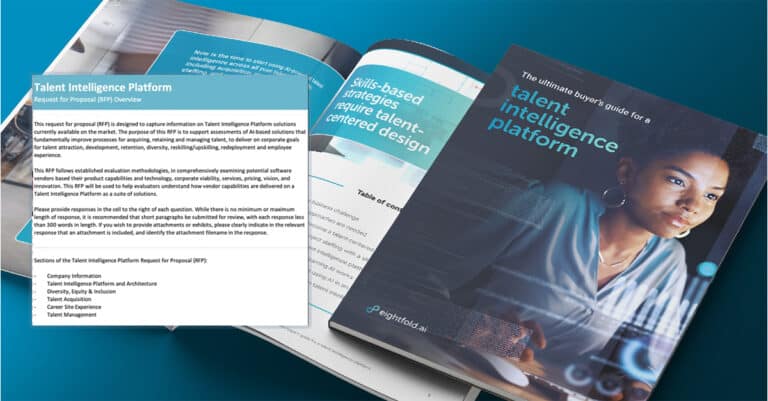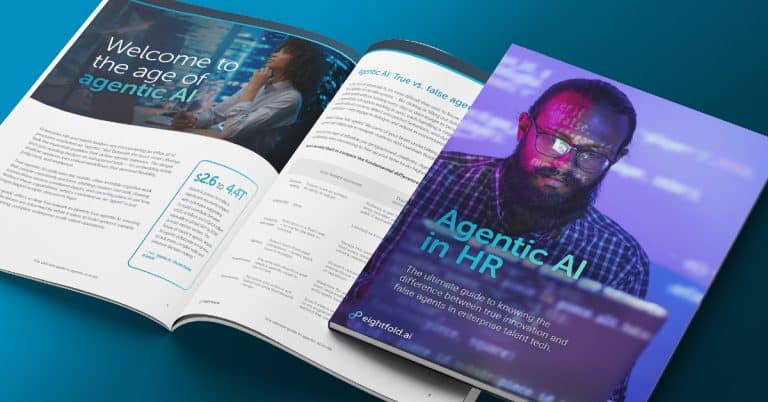Teresa Wykes 0:22
Hi, Gemma, nice to see you. Thanks for joining me.
Gemma Konrad 0:29
Gemma, could you give a quick introduction to who you are before we get into it?
Teresa Wykes 0:35
Yeah, no problem. My name is Gemma Konrad. I am a career and development director at Mars. I’ve been with Mars for just over four years, and I oversee our performance development process and career development at Mars, including leading our talent marketplace pilots.
Teresa Wykes 0:55
Fantastic. Thank you for that, Gemma. And just a little bit about me. I’m here on behalf of Eightfold, and I am a member of our talent center transformation team. So, Gemma, I wanted to have a chat to you today about some background to your transformation work at Mars. I would like to know if you could provide a bit of background to this AI journey, and perhaps why you were considering AI in the first place. Yep,
Teresa Wykes 1:28
no problem. It is fair to say that when we launched our Workday platforms, our core HCM, in 2021, we started being aware that the concept of skills talent marketplaces was a bit of a buzzword in the market. We know there are several early adopters, people like Schneider Electric, and we started thinking about, actually, would a talent marketplace be beneficial for Mars. We had intended to launch as really a tech bolt on anyway, this was delayed due to various internal reasons, and we actually said, Well, what’s the business case for a potential talent marketplace and then the benefit of the AI? So we took the opportunity to look at where a talent marketplace would fit into our overall talent strategy. We have three north stars, which are around the associate experience, which are employees, so access to personalized career development, depending on where they are in their journey, greater transparency and the ability to move between our segments from the line manager lens, the ability to access skills and talent cross segment and also utilize resources in a different way. So use of gigs. And then the third pillar is really looking at the insights and how longer term it can help drive things like our strategic workforce planning. So that was really the driver to think about a talent marketplace. Obviously, the benefit of using talent marketplace that has sort of an underpinning of talent intelligence and AI is that you can actually make that a less manual process, so associates are getting real time information and recommendations through the use of technology.
Gemma Konrad 3:09
Okay, so you had a very clear need to look at this, and you organized it. I like the way you described the organizing it into the three pillars, and you mentioned the business case just there. I’d love to know perhaps, what went into that business case. Can you talk a bit about that? Because I think a lot of people would be quite interested. And I think as you think about embarking on a journey like this, you have to, got to think about the whole organization.
Teresa Wykes 3:36
So yeah, I’d love to hear about that a bit. Yeah, no problem. And I think it’s worth saying that we so we’ve launched talent marketplace as a pilot. Initially. We’re very much calling it a test to learn. And the reason that’s important is this is use of AI in sort of the talent area is new for Mars, and we really wanted to set the scene that this is, it’s not going to be perfect from day one. Will this and will improve and will enhance. So in terms of the business case, the sort of the first pillar around associates was we know that career development is one of the key reasons that people leave Mars. It’s mentioned in our surveys, particularly in our exit interviews, particularly for underrepresented groups. We also know that newer generations coming in really want that personalization. They want the ability to move, and we also know that skills are moving and changing. So really, the business case for us, from an associate perspective, was that personalized career development, not only to drive retention, but also to enable our associate concept around giving career development opportunities transparency and effectively a level playing field for more the line manager perspective, we know that managers need support and greater capacity to get work done quickly, the ability to link into gigs, to access internal talent, which we’re starting to see good progress on. Means I. Over time, there should be less reliance on external consultancies and contractors, and really the ability to start developing that internal talent. And then longer term this, this will be something that comes over time, is as we start to know more about the skills we have and the skills we’re missing linked to our overall business strategy, then it will enable us to to look at doing that more strategic, longer term workforce planning.
Gemma Konrad 5:22
Excellent. I like the way that you link it to your long term business strategy. And I also really like the way you talk about personalized career experiences, and I’ll come back to that in a little while. So that’s great. So we’ve had the sort of the painting of the background there. What I’d love to talk to you a bit about Gemma is how, how a how this technology has allowed you to change your thinking. And I’m thinking things like, perhaps innovation around what you can measure now that you weren’t able to have visibility of before, perhaps things about the way that you run your teams and maybe the way that your your HR processes have changed.
Teresa Wykes 6:07
Yeah, and I think it’s worth saying that this is still we’re in phase one, so we’re sort of testing. We’re learning, I think, a couple of things to call out from, again, the associate lens. It’s enabling us to really link into that. I want to develop a skill. I want to develop a career, and then using the Eightfold technology, I’m so sorry my dog is barking. Sorry about that. So using the Eightfold technology to give those personalized recommendations. So one of the great successes for us has been gigs worth saying that since our pilot, we’ve had 33% of people cross segment. And why that’s really important is that’s what we’ve heard has been a blocker before. If you’re in pet care, unless you know someone within Mars Wrigley or Mars Snacking, it’s very difficult to move across. But what we’ve seen is associates saying I had a development objective, which was to build my experience here, and using gigs has really helped that, and it’s surfacing information to them that they wouldn’t have seen before. Another example on the associate lens is we’ve had an associate whose job has been put at risk, and she said that this is amazing. I can actually see other opportunities, and more importantly, I’m having opportunities recommended to me based on my profiles, as opposed to having to just trawl through and search without knowing very much. So from the associate lens, it’s really starting to change the shape of how they access and find opportunities that are tailored to them. I think the other interesting thing is to call out on gigs, because we’ve always done gigs at Mars, but it’s never been termed out before. It’s always been an informal I know someone, and I might approach them, or my manager knows someone. What we’re seeing with gigs, which is quite interesting. And when we launched the talent marketplace and did line manager training, we had initially for managers, but if I let my associate go into a gig who’s going to get their work done. And what we’re seeing is quite quickly, there’s been a real shift towards gigs. People are understanding the benefit. They’re understanding it links into the 7020, 10 approach, and they’re actually understanding I wouldn’t have necessarily got a contractor to do that work, or I never would have got that work done. And now I can get different perspectives and and different influences, so that within the scale of our pilot is helping us to get different ideas challenge the way that we access resources to get work done.
Gemma Konrad 8:31
That’s nice to hear, nice to hear those human stories, particularly as they apply to people when there’s change going on in the organization. I’d like to talk a bit about. The human element here. I think, you know, it’s quite important at the moment. We’ve got, we’ve got aI encroaching, but I think, you know, there’s, there’s still the very human elements that matter around that. And I know that you and I talked recently, Gemma, a few weeks ago about how you how do you actually get people excited about this? You know, how do you get them engaged and willing to experiment? Perhaps you could tell us a bit about your experience with that.
Teresa Wykes 9:10
Yeah, and it’s interesting, because when we initially launched workday, we launched the skills cloud functionality and, and we’d said to people, but put your skills against your profile and and we had limited success. And really we knew it’s because we didn’t have the what’s in it for me, and that’s what the talent marketplace really brings. So instead of saying you need to add your skills in because we’re asking you to do it, there’s a benefit to it. If I build out my talent marketplace profile, you know, I will be surfaced opportunities. And I think when we launched the talent marketplace, we deliberately enabled all of the functionality, because not everyone might be up for a gig, not everyone might be looking to change jobs, but I might be looking to build a skill within my current role, through a mentor or through learning. So it was really about the what. In It For Me and acknowledging, I think, that it’ll be different from associates who will think the Career Development lens, and then for our managers, who will think, support my associates with career development, but actually, how can I access skills and talent? So you’ve got to clearly articulate why is this important. The other thing, I think, is that we, when we launched it, we had leader buy in. We also launched to our line managers first, and why that’s important, and we do have more work to do on this is really helping associates know that if their managers are supportive, you’re almost giving them permission to go and explore and understand. Because career development’s always been important, and we talk about 70/20/10, but capacity is still a challenge people having the actual capacity to focus on their development.









